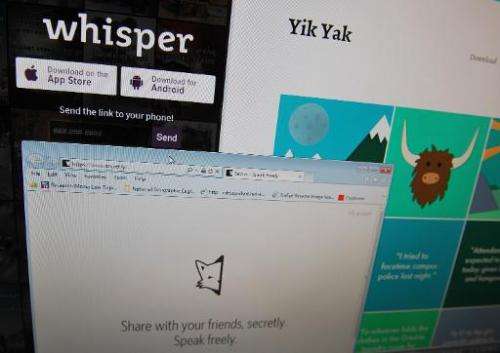In new social networks, anonymity is all the rage

When mobile social app Yik Yak swept into Auburn University, some of the coolest kids were quick to start posting on it. But no one knows who is saying what because the comments are anonymous.
"It spread pretty fast," says Nickolaus Hines, a junior at the school in the US state of Alabama.
"The majority of things are jokes or things which are obviously funny," said the 21-year-old. But "some ... are pretty mean."
Yik Yak, which allows smartphone users to see posts in a radius up to five miles (eight kilometers), is part of a flurry of new apps that offer novel ways to interact on social networks without revealing one's identity.
But while some laud these new platforms, others blame them for false rumors, stress and even suicide.
"Anonymity is a beautiful thing," Yik Yak claims. "It gives people a blank slate to work from, effectively removing all preconceptions about them."
Apps of this kind are certainly raising eyebrows in Silicon Valley and beyond.
Secret, launched last year, recently raised $8.6 million in venture capital.
Whisper, which has been around for almost two years, claims 2.5 billion page views for its service. It has raised a reported $21 million.
It said the app springs from "a deep belief that the way people share and interact with each other is changing."
Other anonymity apps include PostSecret and the brand new Rumr.
A real-time chat service, Rumr says "it's like having a conversation with the lights off."
Ask.fm, a Latvian-based group, says 35 million people have downloaded its anonymous sharing app since June 2013 in more than a dozen countries.

"Ask.fm gives people a chance to communicate and not to be afraid that their views and beliefs can be judged," said spokeswoman Liva Biseniece.
Some say the move to anonymity is a response to a growing ability to track people's activities and social network posts—in some cases leading to lasting reputation damage.
"I think these apps are creating a safe place for people to share their thoughts and opinions," says Daniel Odio, a senior vice president at the social media plug-in Share who follows social networking trends.
"Once you say something, it can't be unsaid. We've seen stories of people who can't get jobs because of what they said on Facebook when they were in college."
Dark side of anonymity
While many college students are attracted to such apps, experts worry about their dark side.
Several high and middle schools have sought to block them because of pranks, rumor-mongering and even bomb threats.
And anonymity can also provide a cloak for cyber bullies.
Justin Patchin at the University of Wisconsin-Eau Claire who co-directs the Cyberbullying Research Center says the apps give tyrants new tools.
"We see veiled threats or open threats," he told AFP. "In these anonymous environments, it's very distressing to students who don't know who to be afraid of."
Prominent venture capitalist Marc Andreessen spoke out on the subject in a series of Twitter posts.
Without naming specific apps, he warned against new services "designed to encourage negative behavior."
"Such experiments start out as naughty fun, end with broken hearts and ruined lives. In the end everyone regrets participating in them," he wrote.
Online 'savagery'
Natasha Burgert, a pediatrician who blogs on children's issues, finds such apps disturbing.
"We have seen time and time again the savagery that can emerge from online anonymity," she wrote.
"In the developing teenager's mind, the long-term consequences and repercussions of these anonymous postings are not physically capable of being understood. And in the most tragic cases, lives are lost by a string of keystrokes."
The apps do allow users to report offensive or inappropriate comments and most are intended for persons 18 and older.
Ask.fm's Biseniece said the firm has "internal safety protocols to detect and remove upsetting content."
Danah Boyd, a Microsoft researcher and author of a book on teens and social networks, said the apps feed basic curiosity.
"What you end up seeing is the full range of human attitudes towards others—good, bad, and mega ugly," Boyd said.
At Auburn University, Hines said he thinks the fad will pass.
"I don't see it getting popular because anonymous things don't have as much," he told AFP.
© 2014 AFP


















